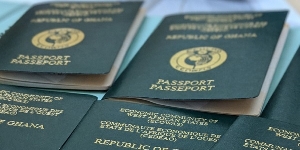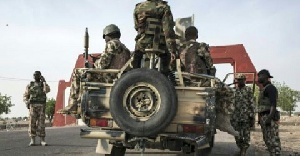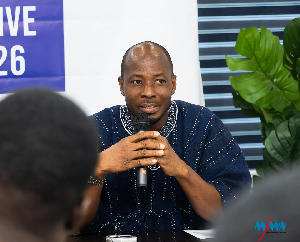Report On A One-Day Visit To Trayal Corporation In Krusevac, Serbia, By His Excellency Dr. Nyaho Nyaho-TamaklOE
In his determination to secure the desired investments into Ghana, His Excellency Dr. Nyaho Nyaho-Tamakloe, on Tuesday, 22 August, 2006, intensified his investment promotion drive with a day’s visit to the offices and factory of Trayal Corporation, manufacturers of Trayal wheel tyres for cars, trucks, tractors, bicycles, motorbikes, fork lifts, aircrafts (both military and civil), with varied sizes.
The company which history dates back to 1889, has its main factory at Krusevac, some 200km South of Belgrade, and engages in three main areas of production, namely tyre production, production of protective devices, and production of pyro-technical (signaling and smoking) devices. The production is carried out at three (3) different factories in three different locations, though tyre production constitutes its core business, raking in approximately 75% of Trayal’s total revenue / income.
Flanked by the President of the Board of Trayal Corporation, Mr. Dragan Jovanovic, the Export Manager, Ms. Vesna Stajic, Mr. Radisa Savic of the Foreign Trade Department and Ms. Danijela Petrovic of the Export Department, the Production Director, Mr. Radisa Veljkovic welcomed His Excllency to the company’s premises at 10:15am. He outlined three major areas of operation of the Company, and the respective roles played by each of the company’s three (3) factories, after having given a brief history of Trayal Corporation which was currently slated for privatization.
The Production Director then proceeded to give a detailed description of the activities of the three factories, emphasizing that whilst the first factory with an employee strength of 300 produces two-wheel tyres for bicycles and motor cycles as well as tubes, the second factory manufactures passenger vehicle tyres of all sizes. Production in that factory, he noted, commenced in 1976 under a joint ventureship with a French company by name Creveche, and the total staff strength stood as 750 personnel. The third factory, located at Krusevac, the site of His Excellency’s visit, was responsible for the production of industrial, truck, agricultural equipment, fork lift, bus and tractor tyres, alongside aircraft tyres (both military and civil). The Production Director asserted that production of aircraft tyres began in 1980 in collaboration with DUNLOP Company. The company, Trayal, was also responsible for the manufacture of tyres for Serbian air crafts including military aircrafts.
With regard to the areas of operation, the Production Director disclosed that aside of tyre production which was the core business of the company, Trayal also produced over 500 different articles of protective devices against nuclear, biological and chemical influence, as well as highly-efficient active carbons for the production of water filters and water cleansing materials. Three different kinds of filters are produced by the company. Some of the protective devices include, among others, assorted safety masks, helmets for industrial use, military camouflage attires, coats and overalls, boots and rain coats / suits both for civilian and military use.
The third area of operation lay in pyrotechnics and the production of signaling and smoking devices, the Production Director noted. Trayal Corporation also produced anti-hydraulic devices which quality and efficiency have been confirmed in the Republics of Croatia and Macedonia.
Expounding on the company’s raw material base, the Production Director asserted that 75% of Trayal’s raw materials was imported from Malaysia and Indonesia which supplied natural rubber, whilst synthetic rubber was imported from Europe, with Turkey and Germany exporting steel to the company. Continuing, he stated that Trayal Corporation further imported coconut shells (husks) from Sri Lanka for the manufacture of active carbons, whilst Ammonium Nitrate used for the production of explosive devices for the mining industry, was imported from Croatia, Hungary and Russia, though the company used to import the coconut shells from Egypt, previously. The Production Director was, however, quick to add that Trayal was willing to import these raw materials from other parts of the world in so long as the quality meets the standards and expectations of the company.
On the scale of balance, however, Trayal records a positive balance of trade despite its huge imports of raw materials. That, according to the Production Director, had been made possible by the export of 67% of the company’s total output to European Union countries which constituted Trayals’s biggest market. Great Britain and Germany, he noted, topped the European exporters while Chile, Egypt and the United States of America made up the other importing countries.
Rounding up, the Production Director intimated that Trayal also engaged in technology transfer with other firms and cited Egypt as one country where Trayal undertook such exercise by helping establish a Production Unit there in 1988.
For his part, the President of the Board of Trayal Corporation, Mr. Dragan Jovanovic, welcomed His Excellency to the premises of Trayal and acknowledged the political and economic changes that had taken place in Serbia (former Yugoslavia) since the year 2000. He disclosed that Trayal was in the process of being privatized, the bid documents of which were ready.
In expressing the desire that fruitful economic cooperation between Serbia and Ghana would be realized shortly for the mutual benefit of the people of the two countries, the President of the Board assured that the affection which Serbians had for Africans in general and Ghanaians in particular still remained strong. He then wished His Excellency and his delegation a successful tour of the factory.
Responding, His Excellency, Dr. Nyaho Nyaho-Tamakloe, expressed gratitude to the Board and Management of Trayal for making the trip possible, given the short notice of the Mission’s request. He observed that the company, though appears modern, had a rich history behind it, and congratulated the management on maintaining standards and keeping the company alive.
His Excellency observed further that if Trayal was able to establish a Production Unit in Egypt, then it was very possible to do same in Ghana given the huge availability of rubber plantation and coconut shells there.
After recounting his fruitful deliberations with the Prime Minister of Serbia and the Office of the Serbian President at which meetings Serbia’s evolving foreign policy towards Africa was discussed, and in particular the intentions of Serbia to use Ghana as a ‘gateway’ to Africa, His Excellency indicated Ghana’s willingness to cooperate with Serbia in general, and Trayal Corporation in specific since there were lots of cooperation possibilities between the two countries. He stated that the main purpose of his visit was to see, at first hand, Trayal’s line of operation and seek the possibility of Ghana supplying the company with raw materials (natural rubber). If that was feasible, a delegation could visit Ghana to see the available rubber plantations. He underscored the Government of Ghana’s current foreign policy orientation of economic diplomacy as being critical to reviving the country’s hitherto dwindling economic fortunes, adding that the current government of Ghana was a staunch advocate of private sector participation and development. That, he noted, would ensure competitiveness and enhance efficiency.
After watching a brief video presentation on the activities of Trayal Corporation, His Excellency was accompanied by Production Director, on a tour of the company’s show room and main tyre factory. At the show room, the Director of the Protective Devices Unit, Ms. Biljana, showed His Excellency round the room and explained the make-up and function of each device to him. On display were, helmets of different colours and sizes, military camouflage attires with overcoats, boots, rain suits/coats of various sizes, explosive devices, filters (both collective and individual ones), among other protective devices.
His Excellency was then escorted to the tyre factory, and still in the company of the Production Director, observed, at first hand, the respective processes of manufacturing truck and industrial tyres, as well as car, bus and tractors tyres. The Director of the factory, Mr. Sveta Radovanovic escorted His Excellency on the factory tour which lasted well over forty minutes, after which His Excellency was led to the 13th Century Krusevac city and Museum, where life for the present-day city of Krusevac actually commenced.












